Paper
For submission of articles or Working Papers to CEsA, please send an email to:
comunicacao@cesa.iseg.ulisboa.pt
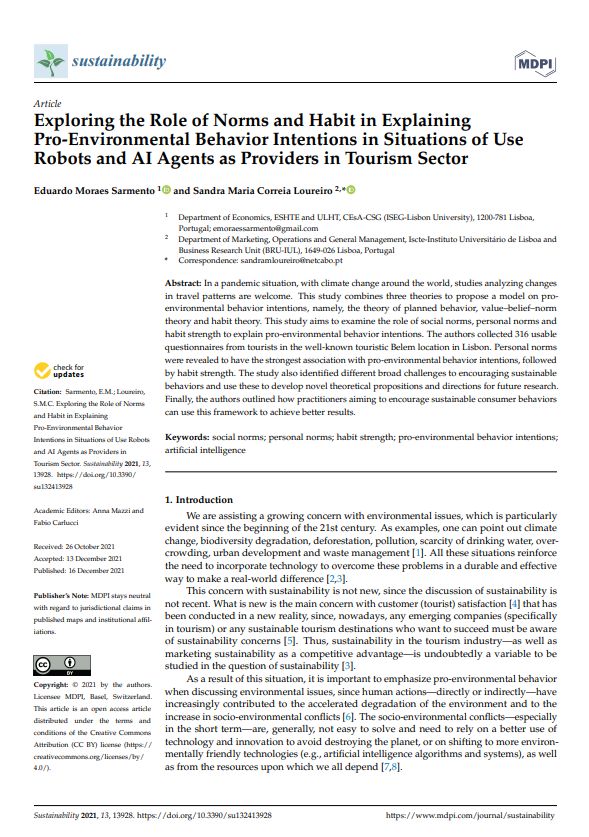
Exploring the Role of Norms and Habit in Explaining Pro-Environmental Behavior Intentions in Situations of Use Robots and AI Agents as Providers in Tourism Sector
Abstract:
In a pandemic situation, with climate change around the world, studies that analyse changes in travel patterns are welcome. Exploring the role of norms and habit in explaining proenvironmental behavior intentions in situations of use robots and AI agents as providers in tourism sector combines three theories to propose a model on pro-environmental behavioural intentions, namely, the theory of planned behaviour, the value-belief-norm theory and the habit theory. This study aims to examine the role of social norms, personal norms and force of habit in explaining pro-environmental behaviour intentions. The authors collected 316 usable questionnaires from tourists in the well-known tourist location of Belem, Lisbon. Personal norms were revealed to have the strongest association with pro-environmental behaviour intentions, followed by force of habit. The study also identified different broad challenges to encourage sustainable behaviours and use them to develop new theoretical propositions and directions for future research. Finally, the authors outlined how practitioners aiming to encourage sustainable consumption behaviours can use this framework to achieve better outcomes.
Quotation:
“Sarmento, E., Loureiro, S. (2021). Exploring the role of norms and habit in explaining proenvironmental behavior intentions in situations of use robots and AI agents as providers in tourism sector. Sustainability. 13, 13928. https://doi.org/10.3390/su132413928
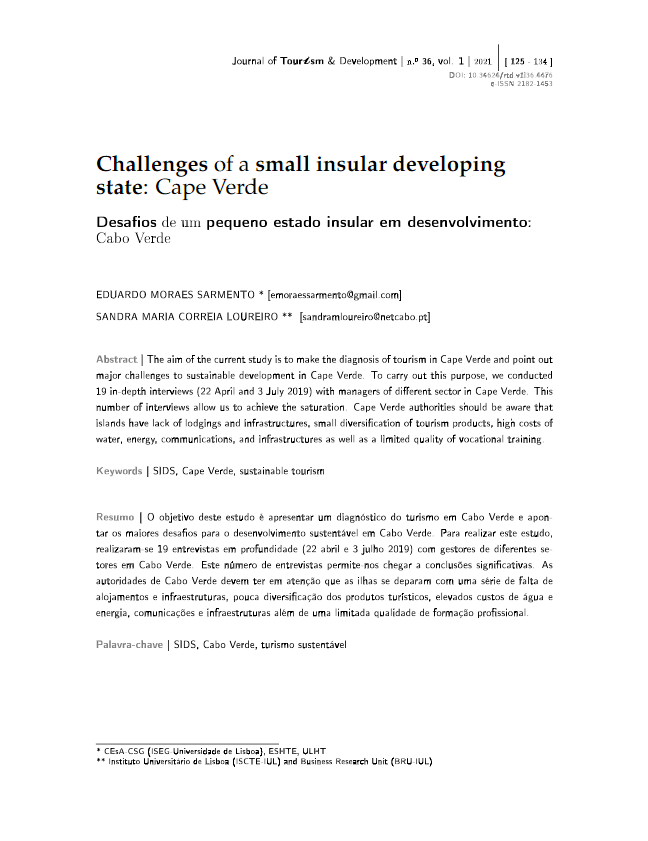
Challenges of a small insular developing state: Cape Verde
Abstract:
The objective of Desafios de um pequeno estado insular em desenvolvimento: Cabo Verde is to present a diagnosis of tourism in Cape Verde and point out the major challenges for sustainable development in Cape Verde. To carry out this study, 19 in-depth interviews (22 April and 3 July 2019) were conducted with managers from different sectors in Cape Verde. This number of interviews allows us to reach significant conclusions. The Cape Verdean authorities must take into account that the islands are faced with a series of shortages of accommodation and infrastructure, little diversification of tourism products, high costs of water and energy, communications and infrastructure in addition to a limited quality of professional training. In order to achieve a hub economy, Cape Verde needs to implement a strong strategy to capture foreign domestic investment (FDI) supported by a strong diplomatic strategy. Like many other SIDS, Cape Verde suffers from an enormous shortage of capital, technology, qualified human resources, high-level organizational capacity, and markets. FDI brings in resources and, in doing so, has direct, indirect, and induced effects on all sectors of economic and social life, as well as the improvement of macroeconomic variables, like GDP, the balance of payments, employment, income and government revenue.
Quotation:
Sarmento, E., & Loureiro, S. M. (2021). Desafios de um pequeno estado insular em desenvolvimento: Cabo Verde. Revista Turismo & Desenvolvimento, 36(1), 125-134. https://doi.org/10.34624/rtd.v1i36.4476
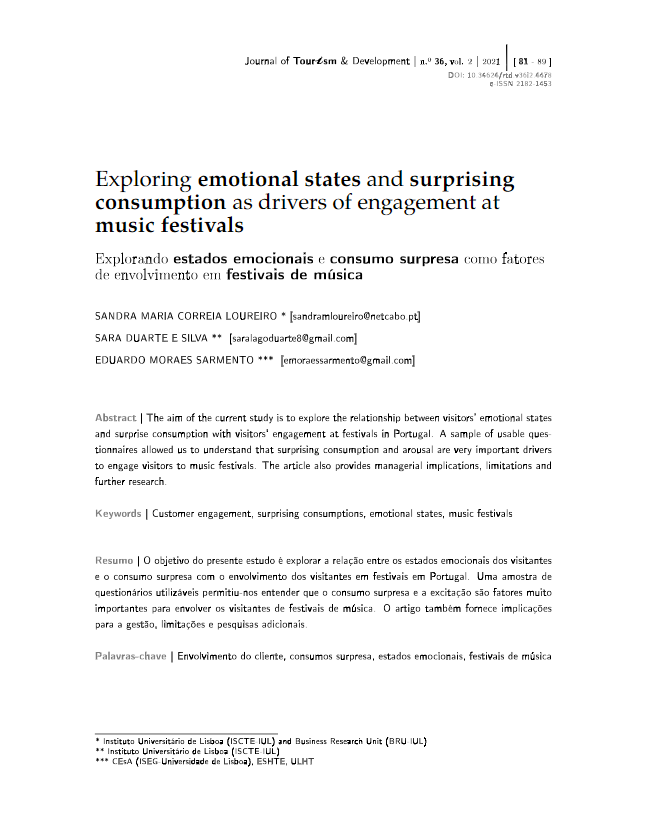
Exploring emotional states and surprising consumption as drivers of engagement at music festivals
Abstract:
The aim of Explorando estados emocionais e consumo surpresa como fatores de envolvimento em festivais de música (Exploring emotional states and surprise consumption as factors of engagement at music festivals) is to explore the relationship between visitors’ emotional states and surprise consumption with visitors’ engagement at festivals in Portugal. A sample of usable questionnaires allowed us to understand that surprise consumption and excitement are very important factors for engaging visitors to music festivals. The article also provides implications for management, limitations and further research. This research has contributed to the field of tourism and event management by providing new insight to the gap found in the literature. This research has provided insights into the different constructs that have an influence on visitor engagement in the context of music festivals. Moreover, here are several relevant areas where this study makes an original contribution, for example by adding visitor engagement in a conceptual model in the context of music festivals. This study is a pioneer from the perspective of music festivals for having introduced the variable of involvement and emotional states and surprising consumption as drivers.
Quotation:
Loureiro, S. M., Silva, S., & Sarmento, E. (2021). Explorando estados emocionais e consumo surpresa como fatores de envolvimento em festivais de música. Revista Turismo & Desenvolvimento, 36(2), 81-89. https://doi.org/10.34624/rtd.v36i2.4478
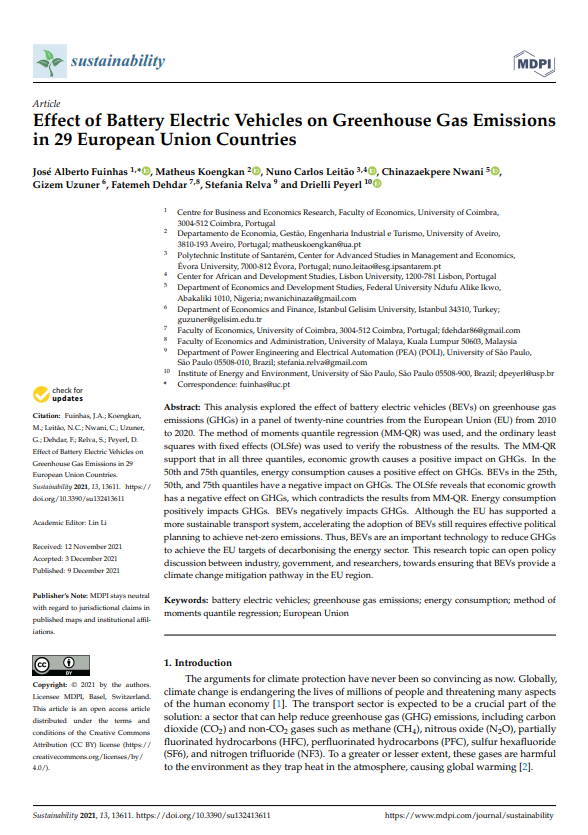
Effect of Battery Electric Vehicles on Greenhouse Gas Emissions in 29 European Union Countries
Abstract:
Effect of Battery Electric Vehicles on Greenhouse Gas Emissions in 29 European Union Countries explored the effect of battery electric vehicles (BEVs) on greenhouse gas emissions (GHGs) in a panel of twenty-nine countries from the European Union (EU) from 2010 to 2020. The method of moments quantile regression (MM-QR) was used, and the ordinary least squares with fixed effects (OLSfe) was used to verify the robustness of the results. The MM-QR support that in all three quantiles, economic growth causes a positive impact on GHGs. In the 50th and 75th quantiles, energy consumption causes a positive effect on GHGs. BEVs in the 25th, 50th, and 75th quantiles have a negative impact on GHGs. The OLSfe reveals that economic growth has a negative effect on GHGs, which contradicts the results from MM-QR. Energy consumption positively impacts GHGs. BEVs negatively impacts GHGs. Although the EU has supported a more sustainable transport system, accelerating the adoption of BEVs still requires effective political planning to achieve net-zero emissions. Thus, BEVs are an important technology to reduce GHGs to achieve the EU targets of decarbonising the energy sector. This research topic can open policy discussion between industry, government, and researchers, towards ensuring that BEVs provide a climate change mitigation pathway in the EU region.
Citação:
Fuinhas, J.A., Koengkan, M., Leitão, N.C., Nwani, C., Uzuner, G., Dehdar, F., Relva, S., Peyerl, D. (2021). Effect of Battery Electric Vehicles on Greenhouse Gas Emissions in 29 European Union Countries. Sustainability, 13 (24), 13611. https://doi.org/10.3390/su132413611
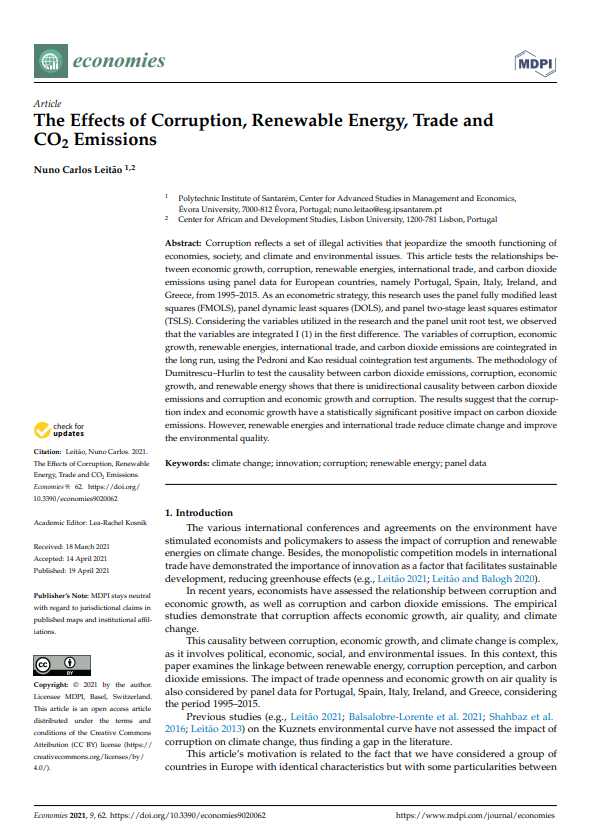
The Effects of Corruption, Renewable Energy, Trade and CO2 Emissions
Abstract:
Corruption reflects a set of illegal activities that jeopardize the smooth functioning of economies, society, and climate and environmental issues. The Effects of Corruption, Renewable Energy, Trade and CO2 Emissions tests the relationships between economic growth, corruption, renewable energies, international trade, and carbon dioxide emissions using panel data for European countries, namely Portugal, Spain, Italy, Ireland, and Greece, from 1995–2015. As an econometric strategy, this research uses the panel fully modified least squares (FMOLS), panel dynamic least squares (DOLS), and panel two-stage least squares estimator (TSLS). Considering the variables utilized in the research and the panel unit root test, we observed that the variables are integrated I (1) in the first difference. The variables of corruption, economic growth, renewable energies, international trade, and carbon dioxide emissions are cointegrated in the long run, using the Pedroni and Kao residual cointegration test arguments. The methodology of Dumitrescu–Hurlin to test the causality between carbon dioxide emissions, corruption, economic growth, and renewable energy shows that there is unidirectional causality between carbon dioxide emissions and corruption and economic growth and corruption. The results suggest that the corruption index and economic growth have a statistically significant positive impact on carbon dioxide emissions. However, renewable energies and international trade reduce climate change and improve the environmental quality.
Quotation:
Leitão, N.C. (2021b). The Effects of Corruption, Renewable Energy, Trade and CO2 Emissions (MDPI) 2021, 9 (2), 62. https://doi.org/10.3390/economies9020062
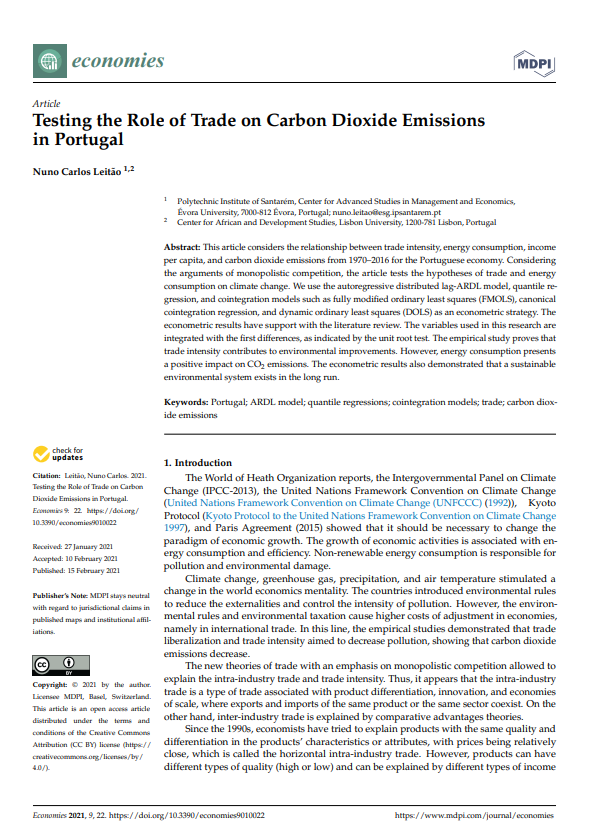
Testing the Role of Trade on Carbon Dioxide Emissions in Portugal
Abstract:
Testing the Role of Trade on Carbon Dioxide Emissions in Portugal considers the relationship between trade intensity, energy consumption, income per capita, and carbon dioxide emissions from 1970–2016 for the Portuguese economy. Considering the arguments of monopolistic competition, the article tests the hypotheses of trade and energy consumption on climate change. We use the autoregressive distributed lag-ARDL model, quantile regression, and cointegration models such as fully modified ordinary least squares (FMOLS), canonical cointegration regression, and dynamic ordinary least squares (DOLS) as an econometric strategy. The econometric results have support with the literature review. The variables used in this research are integrated with the first differences, as indicated by the unit root test. The empirical study proves that trade intensity contributes to environmental improvements. However, energy consumption presents a positive impact on CO2 emissions. The econometric results also demonstrated that a sustainable environmental system exists in the long run. This paper evaluates the theoretical and empirical studies on the effects of trade on carbon dioxide emissions. The theoretical arguments of monopolistic competition models and the relationship between trade intensity and pollution emissions are evaluated, allowing justifying this empirical study’s results. The econometric results show that trade intensity contributes to improving the environment, both in the short and long term, justifying the importance of environmental regulation.
Quotation:
Leitão, N.C. (2021a). Testing the Role of Trade on Carbon Dioxide Emissions in Portugal. Economies (MDPI) 2021,9 (1), 22. https://doi.org/10.3390/economies9010022
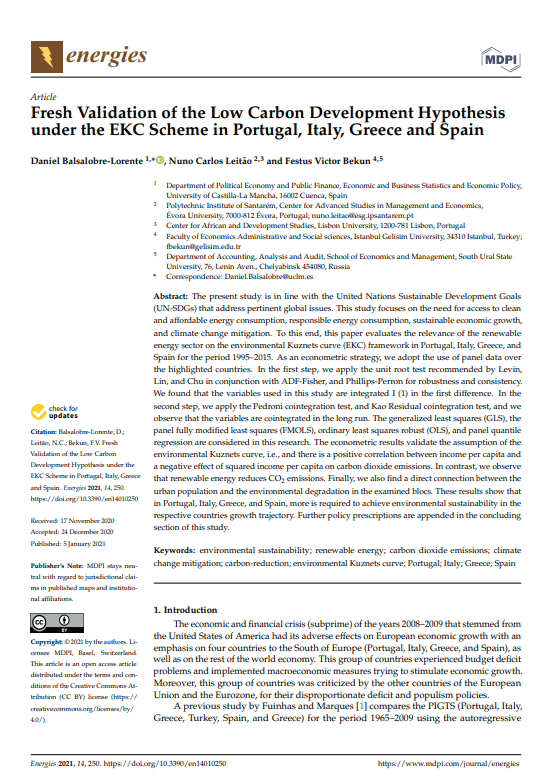
Fresh Validation of the Low Carbon Development Hypothesis under the EKC Scheme in Portugal, Italy, Greece and Spain
Abstract:
Fresh Validation of the Low Carbon Development Hypothesis under the EKC Scheme in Portugal, Italy, Greece and Spain is in line with the United Nations Sustainable Development Goals (UN-SDGs) that address pertinent global issues. This study focuses on the need for access to clean and affordable energy consumption, responsible energy consumption, sustainable economic growth, and climate change mitigation. To this end, this paper evaluates the relevance of the renewable energy sector on the environmental Kuznets curve (EKC) framework in Portugal, Italy, Greece, and Spain for the period 1995–2015. As an econometric strategy, we adopt the use of panel data over the highlighted countries. In the first step, we apply the unit root test recommended by Levin, Lin, and Chu in conjunction with ADF-Fisher, and Phillips-Perron for robustness and consistency. We found that the variables used in this study are integrated I (1) in the first difference. In the second step, we apply the Pedroni cointegration test, and Kao Residual cointegration test, and we observe that the variables are cointegrated in the long run. The generalized least squares (GLS), the panel fully modified least squares (FMOLS), ordinary least squares robust (OLS), and panel quantile regression are considered in this research. The econometric results validate the assumption of the environmental Kuznets curve, i.e., and there is a positive correlation between income per capita and a negative effect of squared income per capita on carbon dioxide emissions. In contrast, we observe that renewable energy reduces CO2 emissions. Finally, we also find a direct connection between the urban population and the environmental degradation in the examined blocs. These results show that in Portugal, Italy, Greece, and Spain, more is required to achieve environmental sustainability in the respective countries growth trajectory. Further policy prescriptions are appended in the concluding section of this study.
Quotation:
Balsalobre-Lorente, D., Leitão, N.C., Bekun, F., V. (2021). Fresh Validation of the Low Carbon Development Hypothesis under EKC Scheme in Portugal, Italy, Greece, and Spain. Energies 2021. 14(1), 250. https://doi.org/10.3390/en14010250
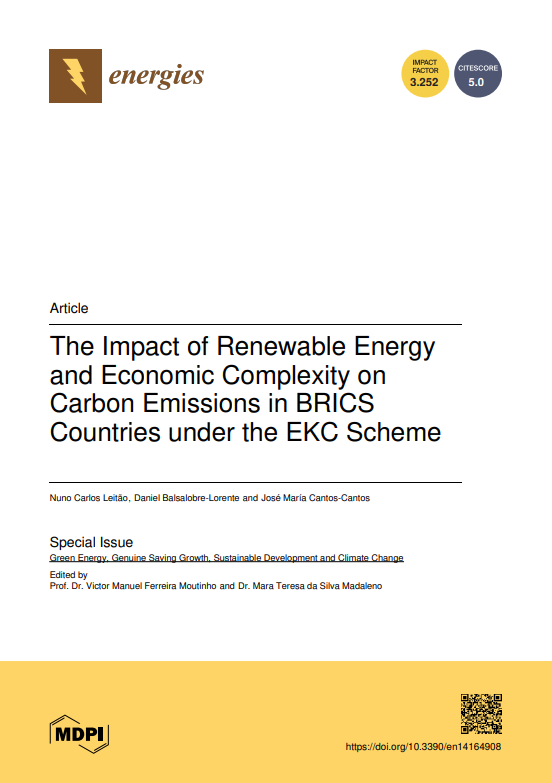
The Impact of Renewable Energy and Economic Complexity on Carbon Emissions in BRICS Countries under the EKC Scheme
Abstract:
Economic complexity makes it possible to assess the development of the countries, the relations of innovation, and the differentiation of products. The Impact of Renewable Energy and Economic Complexity on Carbon Emissions in BRICS Countries under the EKC Scheme considers the links between the hypotheses of the Kuznets environmental curve and economic complexity using panel data for the group of BRICS countries (Brazil, Russia, India, China, and South Africa) from 1990 to 2015. As an econometric strategy, this study considered the panel fully modified least squares (FMOLS), panel dynamic least squares (DOLS), fixed effects (FE), and Panel Quantile Regression. The empirical results showed that economic complexity, income per capita, renewable energy, and carbon dioxide emissions are integrated with the first difference when applying the unit root test. The arguments of Pedroni and Kao cointegration tests were also used. According to these results, the variables used in this research are cointegrated in the long run. The results validated the arguments of the EKC hypothesis, i.e., the income per capita and squared income per capita are positively and negatively correlated with CO2 emissions. Moreover, economic complexity and renewable energy aim to improve environmental damage and climate change.
Quotation:
Leitão, N.C., Balsalobre-Lorente, D., Cantos-Cantos, J.M. The Impact of Renewable Energy and Economic Complexity on Carbon Emissions in BRICS Countries under the EKC Scheme. Energies 2021, 14, 4908. https://doi.org/10.3390/en14164908
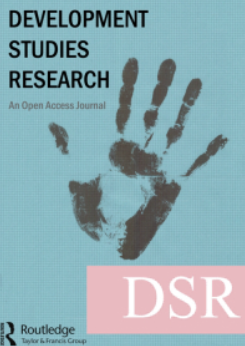
Identifying differences and similarities between donors regarding the long-term allocation of official development assistance
Abstract:
Advanced countries have pledged to mobilize additional financial resources to developing countries, including funding from multiple sources other than official development assistance (ODA), known as foreign aid. However, the effect of the novel coronavirus pandemic has raised doubts about the feasibility of such a pledge, highlighting, once again, the possible role of ODA and the importance of explaining its allocation, which could be of vital relevance for understanding its effectiveness. Identifying differences and similarities between donors regarding the long-term allocation of official development assistance analyzes a vast number of bilateral and multilateral donors by applying a novel methodology in the context of aid allocation – principal-component factor analysis – covering the period 1990–2015. The results revealed four distinct clusters of donors: (i) the proportionally largest Western European donors, characterized by a significant number of beneficiaries, especially low-income countries; (ii) donors that are predominantly driven by structural links with recipients, especially links derived from colonial connections; (iii) a group of mainly Eastern European donors who are engaged with lower-income countries in Eastern Europe and Western Asia; and (iv) a group of Asian and Oceanian donors that select their partners mainly based on the geographical proximity criterion.
Quotation:
Paulo Francisco, Sandrina B. Moreira & Jorge Caiado (2021) Identifying differences and similarities between donors regarding the long-term allocation of official development assistance, Development Studies Research, 8:1, 181-198, DOI: 10.1080/21665095.2021.1954965

Navigating ontological (in)security in EU–Africa relations
Abstract:
When the first six members of the European Economic Community (EEC) took that initial step towards deeper integration that has culminated in what is now the European Union (EU), they also agreed “to associate with … the non-European countries and territories which have special relations with Belgium, France, Italy, the Netherlands and the United Kingdom”. Six decades on and several attempts to re-set EU-Africa relations, it is appropriate to take stock of the relationship especially in light of changes in both continents since 2000. This article draws on the idea of ontological security to understand the nature of changes and continuities in the EU’s engagement with Africa. It argues that EU-Africa relations that have relied on a coloniality of power have also been crucial to the EU’s ontological security. However, increasing African agency and new external actors like China in Africa are challenging this security. While challenges to the EU’s ontological security have been viewed as primarily internally constituted, external challenges within a specific context provides the opportunity to rethink what ontological security demands. Importantly, Navigating ontological (in)security in EU–Africa relations highlights why a partnership of equals is an urgent imperative for the future of EU-Africa relations, although it remains elusive.
Quotation:
Toni Haastrup, Niall Duggan & Luis Mah (2021) Navigating ontological (in)security in EU–Africa relations, Global Affairs, 7:4, 541-557, DOI: 10.1080/23340460.2021.1981144





